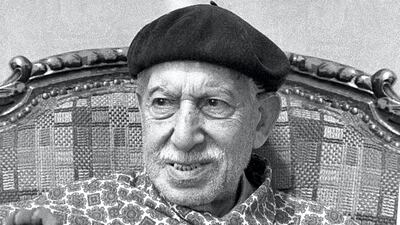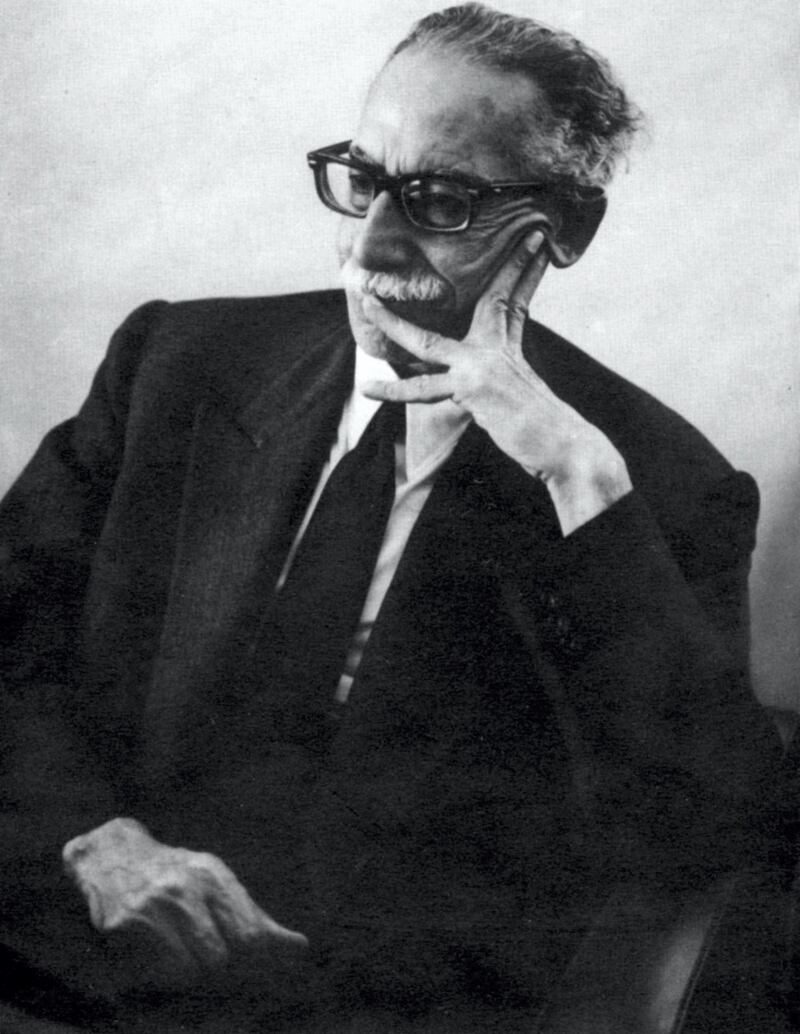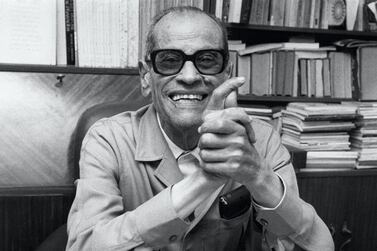Secrecy has long shrouded the Nobel Prize for Literature. Although we know who won the 2019 prize – it went to Peter Handke, with Olga Tokarczuk belatedly announced as the 2018 winner – we don't know who else was on the shortlist, nor whether the Swedish Academy members argued about Handke's politics.
Information about the Nobel nominations are kept sealed for 50 years after the prizes are awarded at a ceremony that takes place in Stockholm each December. Thus, it will likely be January 2070 before we hear about which writers' works went head-to-head with Handke's.
And it’s only now, when the 1969 nominations have finally been made public, that we know the name of the second Arabic-language author ever nominated for the world’s most coveted literary prize: Egyptian playwright, novelist and essayist Tawfiq al-Hakim, who died at the age of 88 in 1987.

A history of Arabic-language authors and the Nobel prize
The first Arabic-language author to appear in the Nobel archives was fellow Egyptian author Taha Hussein (1889-1973), who showed up as a nominee in 1964.
It is hardly surprising that al-Hakim was nominated for the Nobel. The author, whose name was put forward by University of Cairo professor Shawky Deif, was a major force in the development of Egyptian theatre, as well as being an important novelist and a witty public commentator.
He probably would have been on the Nobel’s so-called “Arabic shortlist” of 1988, had he not died the previous year.
RETURN OF THE SPIRIT, the celebrated novel from pioneering Egyptian writer Tawfiq al-Hakim, is available in a new edition with a foreword by Alaa Al Aswany. Learn more about this classic novel of revolution, romance, coming-of-age and political awakening. https://t.co/bzLL52Kzcs pic.twitter.com/E9XUhaV6R7
— Penguin Classics (@PenguinClassics) July 9, 2019
Although we don't yet have any official information about the 1988 prize, translator Denys Johnson-Davies wrote in Memories in Translation about a secret meeting he had with a representative of the Swedish Academy, the body that selects the winners. According to Johnson-Davies, the Academy had a 1988 shortlist that included Sudan's Tayeb Salih, Syrian poet Adonis, Egypt's Yusuf Idris and Naguib Mahfouz, who went on to win the 1988 prize.
Who was Tawfiq al-Hakim?
Al-Hakim's work has received far less global attention than Mahfouz's. However, last year, al-Hakim became the first Arabic-language novelist with a book published by the Penguin Classics imprint. His Return of the Spirit appeared in an updated translation by William Hutchins, with a foreword by Alaa al-Aswany.
“RETURN OF THE SPIRIT I believe marked the true birth of the Arabic novel...[it] was a bombshell." Nobel Prize-winner Naguib Mahfouz on Tawfiq al-Hakim's classic novel, which is included on @lithub's list of most anticipated books of 2019. https://t.co/GWykL8sU4b
— Penguin Classics (@PenguinClassics) July 9, 2019
We don't know whether al-Hakim was ever a serious contender for the Nobel. The 1969 prize eventually went to absurdist Irish writer Samuel Beckett, and, according to coverage in Svenska Dagbladet, it came down to a contest between Beckett and French novelist Andre Malraux, who never did win the prize.
Why 1969 was a big year for diversity
The newly released archives reveal that there were 103 nominees in 1969.
The list includes towering writers from around the world, although most were European men. There appear to be only four women among the 1969 nominees: France's Nathalie Sarraute and Simone de Beauvoir, Germany's Anna Seghers and Bulgaria's Elizabeth Bagriana.
However, 1969 did bring some diversity to the list. In addition to al-Hakim, there were 27 other first-time nominees, including Japanese author Yasushi Inoue and Vietnamese writer Huu Tuong Ho. Argentinian author Jorge Luis Borges and Iranian novelist Mohammad-Ali Djamalzade were also among the year's nominees.
Although a few authors seem an offbeat choice, such as Mika Waltari, a Finnish novelist who wrote the popular novel The Egyptian, most nominees are serious and acclaimed writers whose books, poetry and plays continue to be read.
How does the Nobel Prize for Literature nomination process work?
Nobel nominations are tightly restricted. The process begins in September, the year before a prize is awarded, when nomination forms are sent out. Nominations can come from members of the Swedish Academy or other similar institutions; university professors of literature; previous Nobel Laureates in literature; and heads of writers’ groups, such as writer’s unions or PEN societies. No author can nominate themselves.
The deadline for these nominations is January 31 of the following year. A committee screens the nominations and submits a list for approval to the Swedish Academy. In April, the Academy selects a shortlist of 15 to 20 authors. Five “priority candidates” are selected in May, and the 18 members of the Academy confer in September in order to choose a winner in October.
Taha Hussein, who became known as the "Dean of Arabic Letters", was the first Arabic-language author to be nominated for the prize. He was one of 98 authors from around the world to be nominated for the 1964 Nobel. His nominators that year were Regis Blachere, professor of Arabic language at the University of Paris, and Cesar Dubler, professor of Oriental languages at the University of Zurich. That year's prize ended up going to Jean-Paul Sartre, who turned it down, saying he did not want to be "institutionalised".
Hussein also appears in several other Nobel archives; in 1965, nominated by professor Charles Pellat; in 1967, nominated by professor Jussi Aro; in 1968, nominated by professors in Jordan, Kuwait and Scotland; and in 1969, nominated by professors in Alexandria and Cairo. He likely continued to appear on the nomination lists until his death in October 1973.
As for al-Hakim, time will tell if his name appeared in any future Nobel lists.
Scans of the typescript lists of nominations are available, in Swedish, at www.svenskaakademien.se












